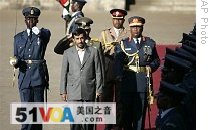Nairobi
24 February 2009
Iranian President Mahmoud Ahmadinejad has arrived in Kenya after a brief visit with leaders in Djibouti. Officials say Mr. Ahmadinejad's visit to Kenya is aimed at significantly boosting trade and improving political ties.
 |
| Iranian President Mahmoud Ahmadinejad, center, inspects the guard of honor, as he arrives at Jomo Kenyatta airport in Nairobi, 24 Feb 2009 |
Iran exports industrial oil, chemicals and carpets to Kenya and Kenya considers Iran a key market for its tea. But several bilateral agreements are expected to be signed, which officials say could see Iran's volume of trade with Kenya rise to $500 million by the end of next year.
Iran says it will remove some of the bureaucracy that used to delay tea shipments and other goods into the country. Kenyan officials are expected to add beef and fish products on the list of exports to Iran.
The two governments have also reportedly agreed to establish direct air links between Nairobi and Tehran, set up a shipping line between the Iranian port of Bandar Abbas and the Kenyan port of Mombasa, and to build an Iranian trade center in Nairobi.
Kenyan media reports have also raised the possibility that Iran may be poised to sign a deal to help Kenya build a nuclear power plant to generate electricity. An Iranian company has already been hired by the Kenyan government to construct a hydroelectric power plant north of Nairobi and a gas power plant near Mombasa.
Kenya seeks nuclear energy program
Joshua Musyimi, who heads an energy development project at the Kenyan Ministry of Planning, says the government has made no secret that it is urgently looking for a partner, who can provide the technical know-how to develop a nuclear energy program for Kenya. He says soaring electricity demand, volatile oil prices, and limited natural resources are some of the reasons why Kenya is interested in nuclear energy.
"Given the situation, the government has decided to diversify power generation resources away from the very high-cost, oil-based power plants," Musyimi said. "So, for a start, it is proposed that the private sector be given an opportunity to develop a 300-1000 megawatt nuclear power plant over the next seven years."
Iran's nuclear ambition has long been a source of alarm for the West and Israel. They have repeatedly accused the Persian Gulf state of using its nuclear facility, not to produce electricity but to produce the plutonium needed to build nuclear weapons.
Obama willing to open dialogue with Iran
Newly-elected U.S. President Barack Obama has indicated that he is willing to open a dialogue with Tehran and Iranian President Mahmoud Ahmadinejad has also signaled a willingness to engage in talks. But Mr. Obama says Iran must first abandon its nuclear program before steps can be taken to improve diplomatic relations.
The United States has not commented on President Ahmadinejad's three-nation tour of east Africa. The Iranian leader is next scheduled to visit the Comoros Islands.